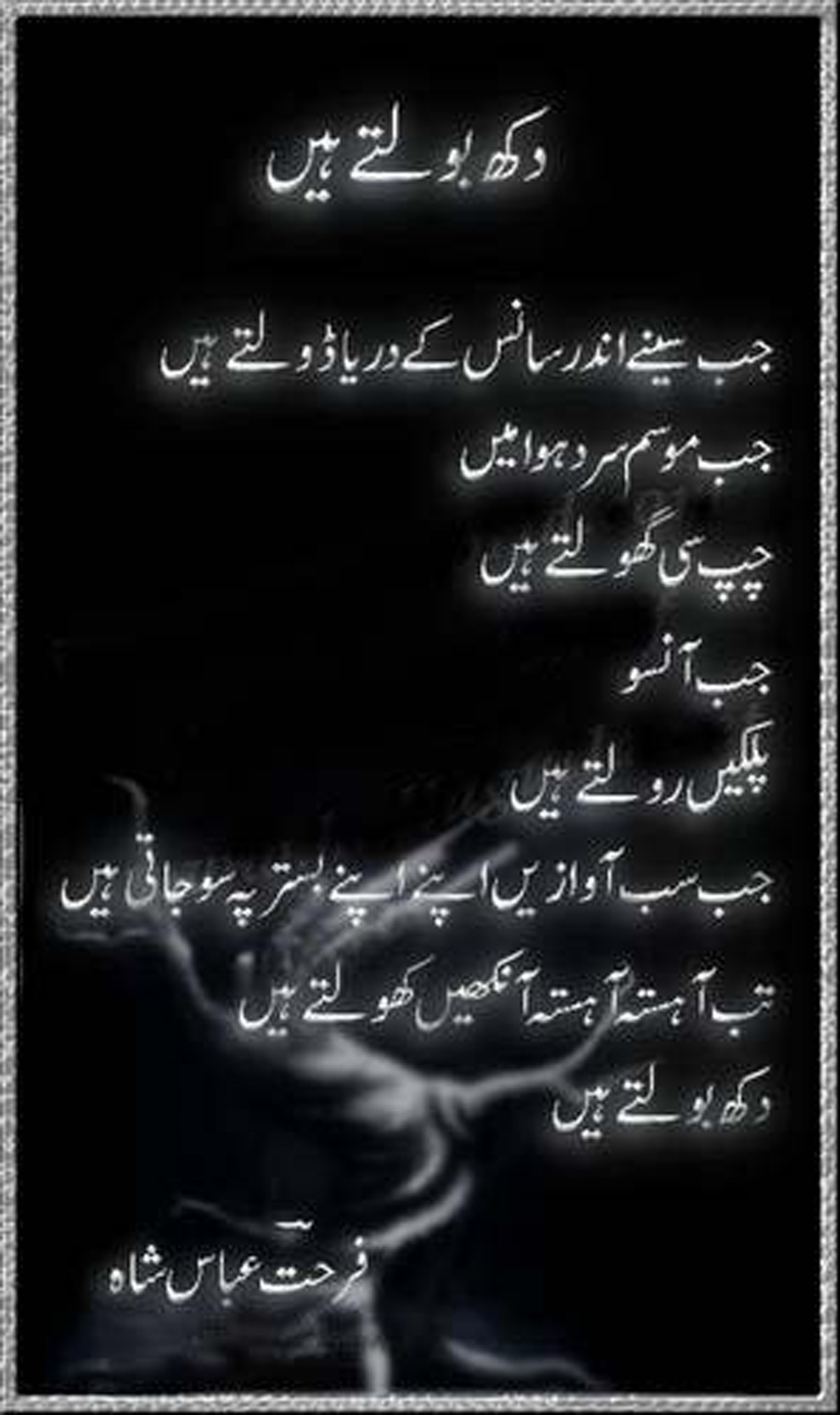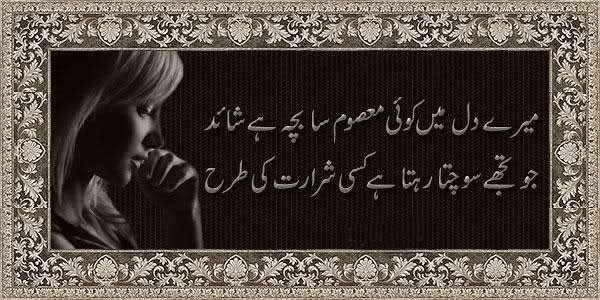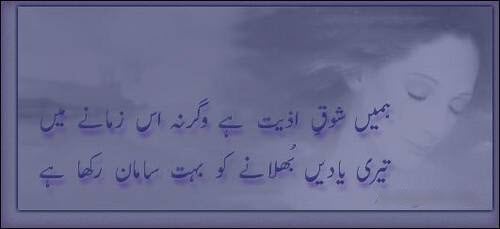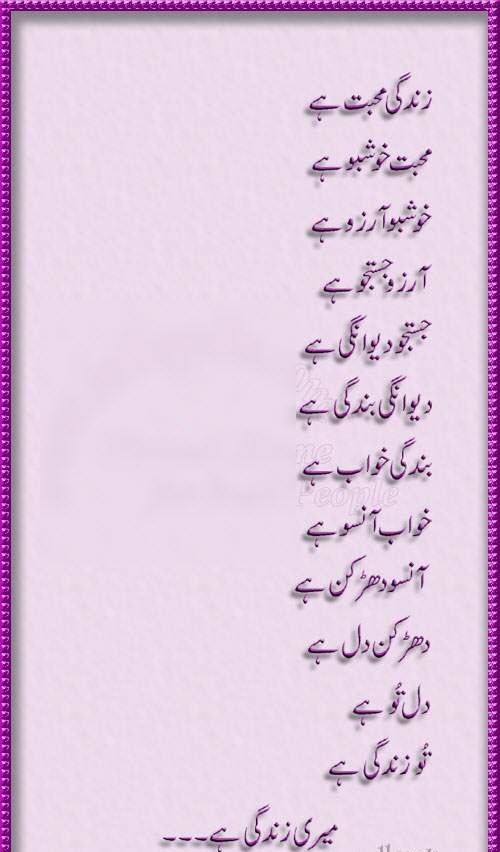Sad Romantic Poetry Biography
Source(Gogle.com.pk)Mirza Asadullah Baig Khan (Urdu/Persian: مرزا اسد اللہ بیگ خان ), pen-name Ghalib (Urdu/Persian: غالب, ġhālib means dominant) and (former pen-name) Asad (Urdu/Persian: اسد, asad means lion) (27 December 1797 — 15 February 1869), was a classical Urdu and Persian poet from India during British colonial rule. During his lifetime the Mughals were eclipsed and displaced by the British and finally deposed following the defeat of the Indian rebellion of 1857, events that he wrote of. Most notably, he wrote several ghazals during his life, which have since been interpreted and sung in many different ways by different people. He is considered, in South Asia, to be the one of the most popular and influential poets of the Urdu language. Ghalib today remains popular amongst Urdu speakers not only in India and Pakistan but also amongst diaspora communities around the world.He never worked for a livelihood, lived on either state patronage, credit or the generosity of his friends.
His fame came to him posthumously. He had himself remarked during his lifetime that although his age had ignored his greatness, it would be recognized by later generations.
Poetry Career
Although Ghalib himself was far prouder of his poetic achievements in Persian, he is today more famous for his Urdu ghazals. Numerous elucidations of Ghalib's ghazal compilations have been written by Urdu scholars. The first such elucidation or Sharh was written by Ali Haider Nazm Tabatabai of Hyderabad during the rule of the last Nizam of Hyderabad. Before Ghalib, the ghazal was primarily an expression of anguished love; but Ghalib expressed philosophy, the travails and mysteries of life and wrote ghazals on many other subjects, vastly expanding the scope of the ghazal. This work is considered his paramount contribution to Urdu poetry and literature.
In keeping with the conventions of the classical ghazal, in most of Ghalib's verses, the identity and the gender of the beloved is indeterminate. The critic/poet/writer Shamsur Rahman Faruqui explains that the convention of having the "idea" of a lover or beloved instead of an actual lover/beloved freed the poet-protagonist-lover from the demands of realism. Love poetry in Urdu from the last quarter of the seventeenth century onwards consists mostly of "poems about love" and not "love poems" in the Western sense of the term.
The first complete English translation of Ghalib's ghazals was written by Sarfaraz K. Niazi and published by Rupa & Co in India and Ferozsons in Pakistan. The title of this book is Love Sonnets of Ghalib and it contains complete Roman transliteration, explication and an extensive lexicon.
Mirza Ghalib was a gifted letter writer. Not only Urdu poetry but the prose is also indebted to Mirza Ghalib. His letters gave foundation to easy and popular Urdu. Before Ghalib, letter writing in Urdu was highly ornamental. He made his letters "talk" by using words and sentences as if he were conversing with the reader. According to him "sau kos se ba-zaban-e-qalam baatein kiya karo aur hijr mein visaal ke maze liya karo" [ from hundred of miles talk with the tongue of the pen and enjoy the joy of meeting even when you are separated] His letters were very informal, some times he would just write the name of the person and start the letter. He himself was very humorous and also made his letter very interesting. He said "main koshish karta hoon keh koi aisi baat likhoon jo parhay khoosh ho jaaye" [ I want to write the lines that whoever reads those should enjoy it] When the third wife of one of his friends died, he wrote... Some scholar says that Ghalib would have the same place in Urdu literature if only on the basis of his letters.They have been translated into English by Ralph Russell, The Oxford Ghalib.
Ghalib was a chronicler of this turbulent period.One by one, Ghalib saw the bazaars – Khas Bazaar, Urdu Bazaar, Kharam-ka Bazaar, disappear, whole mohallas (localities) and katras (lanes) vanish. The havelis (mansions) of his friends were razed to the ground. Ghalib wrote that Delhi had become a desert. Water was scarce. Delhi was now “ a military camp”. It was the end of the feudal elite to which Ghalib had belonged. He wrote:
“An ocean of blood churns around me- Alas! Were these all!
The future will show
What more remains for me to see”.
Popular legend has it that he changed his pen name to 'Ghalib' when he came across this sher (couplet) by another poet who used the takhallus (pen name) 'Asad':
The legend says that upon hearing this couplet, Ghalib ruefully exclaimed, "whoever authored this couplet does indeed deserve the Lord's rahmat (mercy) (for having composed such a deplorable specimen of Urdu poetry). If I use the takhallus Asad, then surely (people will mistake this couplet to be mine and) there will be much la'anat (curse) on me!" And, saying so, he changed his takhallus to 'Ghalib'.
However, this legend is little more than a figment of the legend-creator's imagination.takhallus 'Asad' appears more infrequently in Ghalib's work than 'Ghalib', it appears that he did use both his noms de plume interchangeably throughout his career and did not seem to prefer either one over the other.
Personal Life
Mirza was born in Kala Mahal in Agra. In the end of 18th century, his birthplace was converted into Indrabhan Girls' Inter College. The birth room of Mirza Ghalib is preserved within in the school. Around 1810, he was married to Umrao Begum, daughter of Nawab Ilahi Bakhsh Khan of Loharu (younger brother of the first Nawab of Loharu, Nawab Mirza Ahmad Baksh Khan , at the age of thirteen. He had seven children, none of whom survived (this pain has found its echo in some of Ghalib's ghazals). There are conflicting reports regarding his relationship with his wife. She was considered to be pious, conservative and God-fearing.
Ghalib was proud of his reputation as a rake. He was once imprisoned for gambling and subsequently relished the affair with pride. Once, when someone praised the poetry of the pious Sheikh Sahbai in his presence, Ghalib immediately retorted, "How can Sahbai be a poet? He has never tasted wine, nor has he ever gambled; he has not been beaten with slippers by lovers, nor has he ever seen the inside of a jail." In the Mughal court circles, he even acquired a reputation as a "ladies' man".
He died in Delhi on February 15, 1869. The house where he lived in Gali Qasim Jaan, Ballimaran, Chandni Chowk, in Old Delhi has now been turned into 'Ghalib Memorial' and houses a permanent Ghalib exhibition.
Sad Romantic Poetry in Urdu SMS in Urdu Pics by Wasi Shah Wallpapers About Love on Facebook in English
Sad Romantic Poetry in Urdu SMS in Urdu Pics by Wasi Shah Wallpapers About Love on Facebook in English

Sad Romantic Poetry in Urdu SMS in Urdu Pics by Wasi Shah Wallpapers About Love on Facebook in English
Sad Romantic Poetry in Urdu SMS in Urdu Pics by Wasi Shah Wallpapers About Love on Facebook in English


Sad Romantic Poetry in Urdu SMS in Urdu Pics by Wasi Shah Wallpapers About Love on Facebook in English


Sad Romantic Poetry in Urdu SMS in Urdu Pics by Wasi Shah Wallpapers About Love on Facebook in English

Sad Romantic Poetry in Urdu SMS in Urdu Pics by Wasi Shah Wallpapers About Love on Facebook in English
Sad Romantic Poetry in Urdu SMS in Urdu Pics by Wasi Shah Wallpapers About Love on Facebook in English

Sad Romantic Poetry in Urdu SMS in Urdu Pics by Wasi Shah Wallpapers About Love on Facebook in English
Sad Romantic Poetry in Urdu SMS in Urdu Pics by Wasi Shah Wallpapers About Love on Facebook in English
Sad Romantic Poetry in Urdu SMS in Urdu Pics by Wasi Shah Wallpapers About Love on Facebook in English

Sad Romantic Poetry in Urdu SMS in Urdu Pics by Wasi Shah Wallpapers About Love on Facebook in English

Sad Romantic Poetry in Urdu SMS in Urdu Pics by Wasi Shah Wallpapers About Love on Facebook in English
Sad Romantic Poetry in Urdu SMS in Urdu Pics by Wasi Shah Wallpapers About Love on Facebook in English

No comments:
Post a Comment